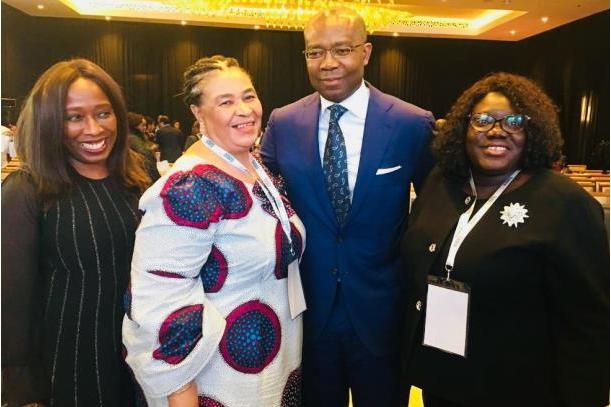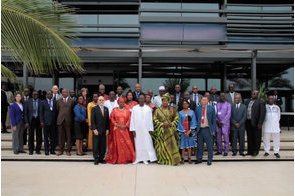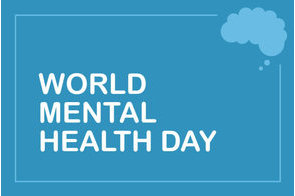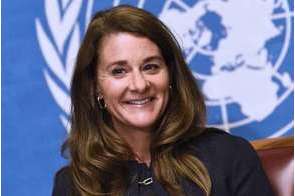Access Bank joins private sector coalition for health care delivery in Africa

Summary
As part of Access Bank's commitment to lead global best practices in sustainable finance in Nigeria and Africa, the bank has introduced – and is financing – various health care initiatives.
Studies have shown a positive correlation between health care expenditures and health outcomes. However, health care financing in Africa is abysmally low. Consequently, this has led to poor health outcomes. For instance, the continent accounts for 25 percent of the global disease burden. 88 percent of all global malaria cases and 90 percent of malaria-related deaths occur in Africa, a region that is also home to 60 percent of the people living with HIV/AIDS.
Therefore, increasing funding as an imperative of improved health care in Africa is inescapable. Health care is one of the key aspects of human and economic development. The other aspect being education. It goes without saying that a healthy citizen will be more productive, earn more, and consume more. All these have positive implications for the Gross Domestic Product (GDP) of countries.
A 2011 World Health Organisation's report, tagged "Investing in health for Africa: The case for strengthening systems for better health outcomes", said investing in the African health sector would do much more than save millions of lives and prevent life-long disabilities. Efforts made to improve Africa's health care systems will improve the continent's economy as well.
This important message has been heeded by a coalition of African business leaders and philanthropists who launched the African Business Coalition for Health (ABC Health) last month. Access Bank Plc was among the group that comprised of Aliko Dangote Foundation, GBCHealth and the United Nations Economic Commission for Africa (ECA).
The ABC Health was launched on February 12, 2019, in Addis Ababa, Ethiopia, at the maiden edition of the Africa Business Health Forum (ABHF), which took place on the margins of the 32nd African Union Summit. The forum was set up as a regional platform to strengthen partnerships, enhance collaboration between African private and public sectors, and foster opportunities for the private sector to contribute towards strengthening national health systems.
The African business leaders were joined at the 2019 ABHF by heads of government from various African countries, diplomats, medical professionals and other stakeholders. Among the heads of government present at the Forum were the Prime Minister of Ethiopia, Abiy Ahmed; President of Djibouti, Omar Gilles; and the President of Botswana, Mokgweetsi Masisi.
Indeed, an endorsement by the African Heads of State in attendance came on the heels of the ABC Health launch in Addis Ababa. The aim of the coalition is to mobilize business leaders, governments and other stakeholders to crowd-in private investment into the health care sector, champion health care reform agenda and boost innovative solutions that will improve health outcomes on the continent.
At the event, members of the African Business Coalition for Health emphasised the need to contribute more to meeting national and regional health goals in the context of the United Nations Sustainable Development Goals (SDGs) and Africa Agenda 2063. The main aim is to improve the standard of living of the people in general and also focus on the wellbeing of employees for a more active and productive workforce.
Speaking on the panel on behalf of the Group Managing Director/CEO of Access Bank, Dr. Herbert Wigwe, Dr. Ajoritsedere Awosika highlighted Access Bank's efforts in driving the development of the Nigerian health care system through various initiatives and collaborations. As part of the bank's commitment to lead global best practices in sustainable finance in Nigeria and Africa, Access Bank has introduced – and is financing – various health care initiatives.
Among the bank's programmes is "Malaria To Zero" – a bold campaign designed to accelerate progress in the malaria elimination agenda of the Nigerian government. The goal of the campaign is to save one million lives by 2020 by leveraging private sector financing and other resources in the fight against the deadly malaria disease, which accounts for an estimated 207,000 deaths annually (approximately 30 percent of the total malaria burden in Africa).
Apart from the actual malaria infection cases, 97 percent of the country's population is at risk of infection. Hence, the Access Bank-led campaign is an innovative approach that would help raise the required resources to combat and eliminate the disease.
HIV/AIDS, which affects 3.1 million Nigerians – or 8 percent of the global population of those living with the virus – is also a public health problem that Access Bank is working with partners to address. As Co-Chair of Nigerian Business Coalition Against AIDS (NiBUCAA), Access Bank's GMD/CEO represents the bank at the coalition, which is leading private sector HIV intervention programmes in the country. The coalition has a stated commitment to fight the HIV/AIDS pandemic at all levels of intervention within the health system and the private sector workforce. The coalition is helping increase awareness about various HIV treatment and intervention programmes. One of the ways to reduce the spread of the virus is to expand access to antiretroviral therapy (ART) to people living with HIV.
Speaking during the strategic discussion session at the ABHF, Omobolanle Victor-Laniyan, Head, Sustainability, Access Bank, said that NiBUCAA is working on plans to launch an HIV Trust Fund geared towards increasing private sector funding for the treatment and eradication of HIV in Nigeria as well as Africa.
During the panel discussion at the forum, Awosika – who is an Independent Director at Access Bank – provided some insights and updates on the bank's products and initiatives, which are part of Access Bank's award-winning sustainability agenda. She spoke about the Maternal Health Support Scheme (MHSS), which offers discounted financing for medical procedures for women. Another product is the Betta Mama Betta Pikin initiative that provides an opportunity for mothers and their children to gain access to health insurance. Access Bank's flagship Hospital Facility Upgrade Support Scheme (HFUSS) has helped to address the deficit of equipment/facilities at primary and secondary health care centres to improve quality of health care. Over 30 hospitals have benefitted from this initiative.
Aigboje Aig-Imoukhuede, Co-Chair of the GBCHealth – a private sector coalition focused on improving health outcomes – said, although significant progress in the funding of health care has been recorded in Africa, there is still a long way to go to achieve the SDG Goal 3, which focuses on universal health coverage. The goal seeks an end to the epidemics of major communicable diseases and reduction in non-communicable and environmental diseases.
According to Aig-Imoukhuede, who is former GMD/CEO of Access Bank, health care in Africa is constrained by scarce public funding and limited donor support. He said out-of-pocket expenditure accounts for 36 percent of Africa's total health care spending. This is inadequate to meet Africa's needs. Hence, a sustainable solution to address the health care funding gap could be Public-Private Partnerships (PPP), as advocated by Awosika. She also enjoined other participants to support this framework for effective health care delivery.
Halima Aliko-Dangote, Executive Director of Aliko Dangote Foundation, who represented the Chairman of the Foundation, Aliko Dangote, agreed on the need for significant investments in Africa's health care systems to meet the needs of the growing population.
By 2050, Africa's population is projected to be more than 50 percent of global population. This presents both opportunities and risks, depending on how governments are going to invest in their people to leverage the potential demographic dividend.
If the life expectancy of Africa's population increases – as this would be a function of improved health outcomes – research has shown there would be a positive economic impact, measured by increase in GDP. African business leaders and governments are, therefore, enjoined to contribute to increasing health funding, and strengthen the capacity of all countries to attain good health and well-being for all.
Related
-
West African leaders pledge to implement integrated approach to public health
By taking an integrated approach, communities can identify outbreaks in animals before they spread to humans.
-
World Mental Health Day 2019 focuses on suicide prevention
An estimated 20-30 per cent of Nigeria’s population is believed to suffer from mental disorders.
-
Gates Foundation pledges additional $250 million to COVID-19 response
The People's Vaccine Alliance warned that rich countries were hoarding COVID-19 vaccines and leaving developing countries ...










